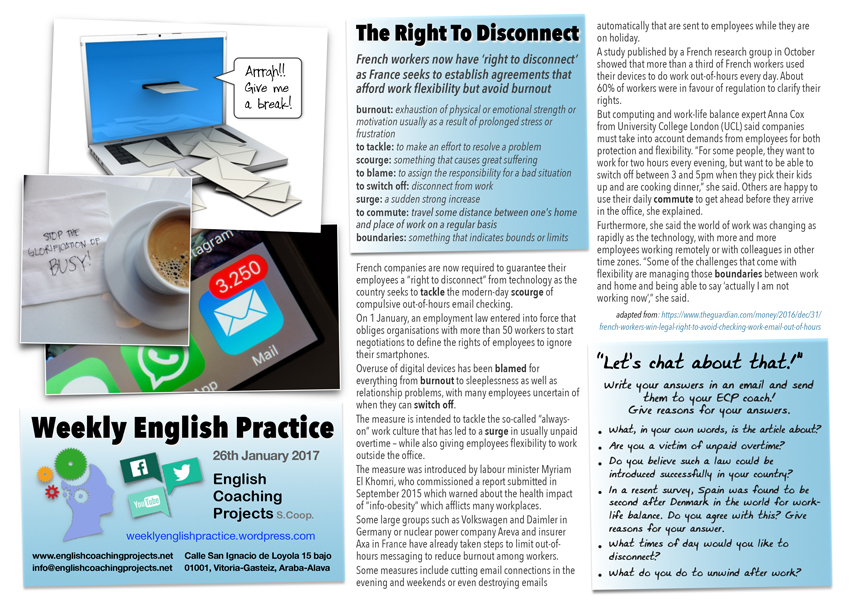Click on the image to download the pdf
French workers now have ‘right to disconnect’ as France seeks to establish agreements that afford work flexibility but avoid burnout
Vocabulary. Read and check you understand this before you read and listen to the article:
burnout: exhaustion of physical or emotional strength or motivation usually as a result of prolonged stress or frustration
to tackle: to make an effort to resolve a problem
scourge: something that causes great suffering
to blame: to assign the responsibility for a bad situation
to switch off: disconnect from work
surge: a sudden strong increase
to commute: travel some distance between one’s home and place of work on a regular basis
boundaries: something that indicates bounds or limits
French companies are now required to guarantee their employees a “right to disconnect” from technology as the country seeks to tackle the modern-day scourge of compulsive out-of-hours email checking.
On 1 January, an employment law entered into force that obliges organisations with more than 50 workers to start negotiations to define the rights of employees to ignore their smartphones.
Overuse of digital devices has been blamed for everything from burnout to sleeplessness as well as relationship problems, with many employees uncertain of when they can switch off.
The measure is intended to tackle the so-called “always-on” work culture that has led to a surge in usually unpaid overtime – while also giving employees flexibility to work outside the office.
The measure was introduced by labour minister Myriam El Khomri, who commissioned a report submitted in September 2015 which warned about the health impact of “info-obesity” which afflicts many workplaces.
Some large groups such as Volkswagen and Daimler in Germany or nuclear power company Areva and insurer Axa in France have already taken steps to limit out-of-hours messaging to reduce burnout among workers.
Some measures include cutting email connections in the evening and weekends or even destroying emails automatically that are sent to employees while they are on holiday.
A study published by a French research group in October showed that more than a third of French workers used their devices to do work out-of-hours every day. About 60% of workers were in favour of regulation to clarify their rights.
But computing and work-life balance expert Anna Cox from University College London (UCL) said companies must take into account demands from employees for both protection and flexibility. “For some people, they want to work for two hours every evening, but want to be able to switch off between 3 and 5pm when they pick their kids up and are cooking dinner,” she said. Others are happy to use their daily commute to get ahead before they arrive in the office, she explained.
Furthermore, she said the world of work was changing as rapidly as the technology, with more and more employees working remotely or with colleagues in other time zones. “Some of the challenges that come with flexibility are managing those boundaries between work and home and being able to say ‘actually I am not working now’,” she said.
adapted from: https://www.theguardian.com/money/2016/dec/31/french-workers-win-legal-right-to-avoid-checking-work-email-out-of-hours
“Let’s chat about that!”
Write your answers and send them by email to your ECP coach. Why not record your voice too? Listen to yourself speak and identify what you have to improve on 🙂
Give reasons for your answers.
- What, in your own words, is the article about?
- Are you a victim of unpaid overtime?
- Do you believe such a law could be introduced successfully in your country?
- In a resent survey, Spain was found to be second after Denmark in the world for work-life balance. Do you agree with this? Give reasons for your answer.
- What times of day would you like to disconnect?
- What do you do to unwind after work?


